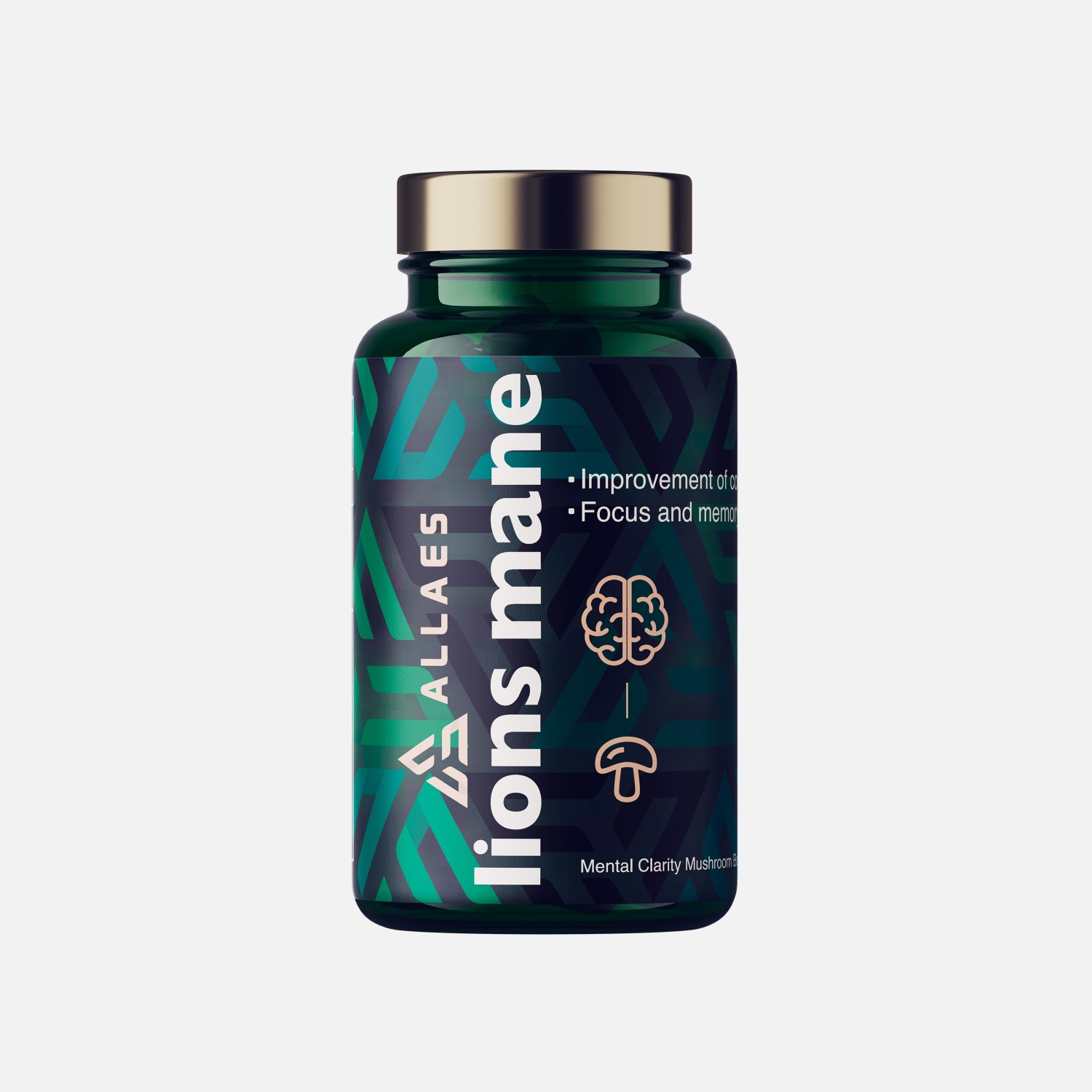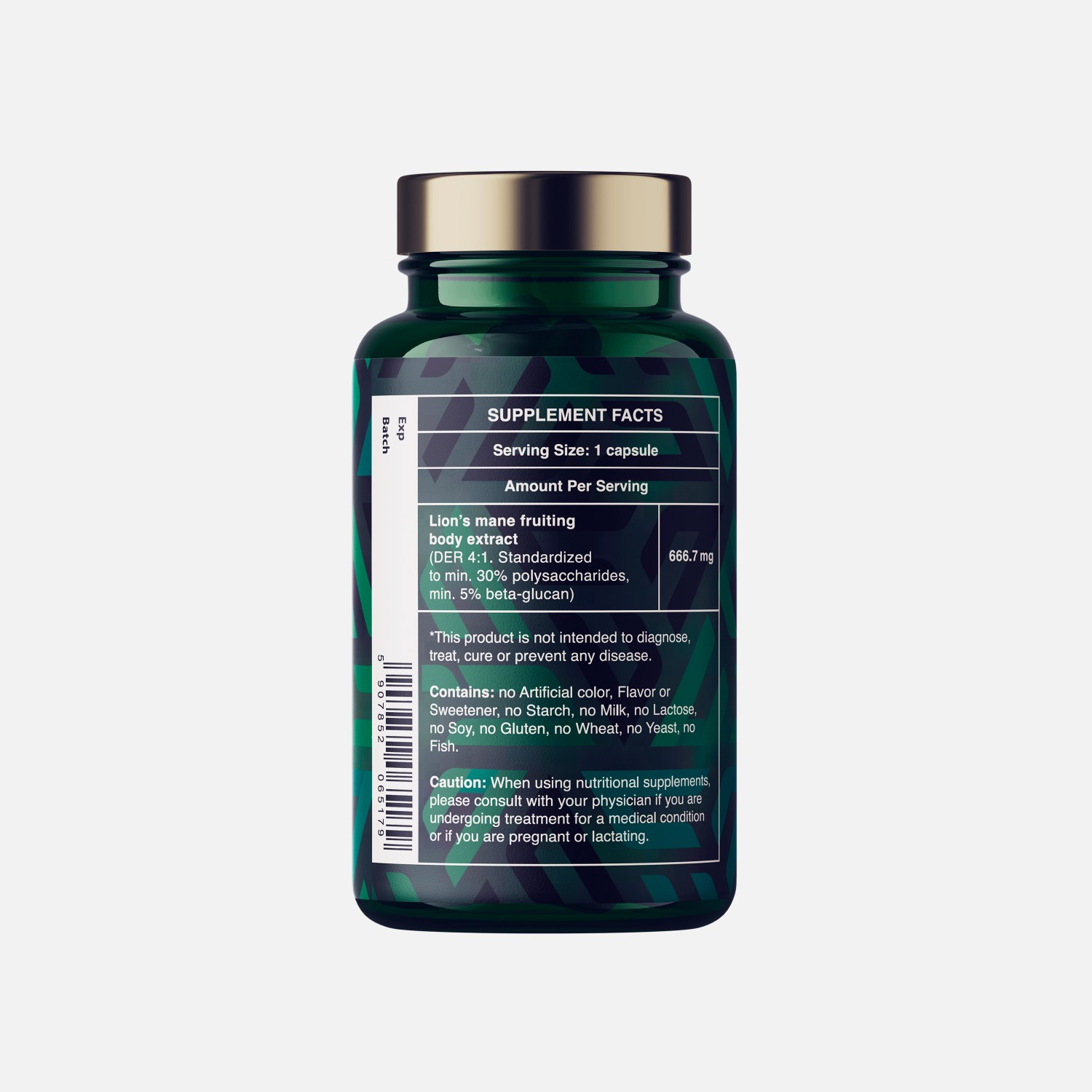



- Verfügbarkeit: Auf Lager
- Package: 666 mg / 60 capsules
Lion's Mane (Hericium erinaceus) – a nootropic and neuroprotector for cognitive enhancement, brain support, and neurodegeneration prevention
Lion’s Mane (Hericium erinaceus) is a unique mushroom with powerful neuroprotective and nootropic properties, widely used in both traditional and scientific medicine. Its key feature is the ability to stimulate the synthesis of NGF (Nerve Growth Factor), which is essential for the growth, repair, and protection of neurons. This makes Lion’s Mane an ideal supplement for improving memory, focus, emotional balance, and slowing down age-related cognitive decline.
Lion’s Mane helps your brain adapt to stress, recover from overload, and maintain cognitive stability—even under chronic fatigue or age-related changes. Its effectiveness is supported by both clinical studies and laboratory research, with more evidence emerging every year.
Who can benefit from Lion's Mane?
✔ If you experience problems with focus, memory, or constant mental fog — this supplement promotes neurogenesis, enhancing cognitive function and mental clarity.
✔ If you're dealing with chronic stress, anxiety, or emotional instability — Lion’s Mane supports brain health and helps normalize nervous system function.
✔ If you're recovering from head trauma, stroke, or extreme mental fatigue — Lion’s Mane may accelerate neural tissue regeneration.
✔ If you're looking to protect your brain from age-related decline — Lion’s Mane helps maintain neuronal health, improve memory, and may reduce the risk of neurodegenerative diseases such as Alzheimer’s and dementia.
✔ If you engage in intensive mental work or studies — it can boost focus, information processing speed, and learning capacity.
✔ If you use psychoactive substances or PEDs — it helps preserve brain health, reduce neurotoxicity, and support cognitive recovery.
How does Lion’s Mane work?
The mechanism of action of Lion’s Mane is based on two unique groups of active compounds — hericenones and erinacines. These bioactive substances cross the blood-brain barrier and directly stimulate the production of NGF (Nerve Growth Factor) — a protein essential for the growth, survival, and repair of neurons. By increasing NGF levels, Lion’s Mane activates neurogenesis, enhances the formation of new neural connections, and supports the regeneration of damaged nerve tissue.
In addition, Lion’s Mane promotes the repair of the myelin sheath — the insulating layer around nerve fibers that ensures fast and accurate signal transmission. Myelin disruption is associated with cognitive decline, chronic fatigue, and neurodegenerative diseases. Thanks to hericenones and erinacines, this mushroom also reduces levels of pro-inflammatory cytokines, protects neurons from oxidative stress, and helps normalize dopamine and serotonin activity, which positively impacts mood and learning capacity.
It’s important to note that Lion’s Mane doesn’t act like typical stimulants such as caffeine. It doesn’t force brain activity but gently supports the body’s natural mechanisms, helping to restore internal balance and enhance long-term adaptability.
How to take Lion’s Mane correctly
- Recommended dosage: 1–2 capsules per day (equivalent to 666–1333 mg of extract). This is the optimal range for improving cognitive function, memory, and nervous system recovery.
- Maximum dosage: Up to 3 g per day. Higher doses are not considered dangerous, but they are still poorly studied in clinical settings. It’s best to start with the minimum effective dose and monitor your body’s response.
- Best time to take: Preferably in the morning or during the day. However, if you tolerate Lion’s Mane well, you can also take it in the evening—most people don’t experience sleep disturbances, and some even report improved sleep. Start with daytime intake and adjust based on your individual response.
- How long to take: At least 4 weeks. Most users report noticeable effects within 8–12 weeks, but even long-term use (up to 49 weeks) has shown no adverse effects. It’s a good idea to take a 2–4 week break between cycles to maintain sensitivity and support adaptive balance. Keep in mind that the effect is cumulative—don’t expect immediate results from the first capsule. Initial changes are typically noticeable within 1–2 weeks of consistent use.
Composition matters!
The key difference in a high-quality Lion’s Mane supplement lies in which part of the mushroom the extract comes from. Most low-cost products on the market are made from mycelium grown on grain. Mycelium contains minimal amounts of active compounds, especially hericenones, and is often diluted with residual substrate, resulting in very low biological activity.
In our product, we use only fruiting body extract, not mycelium. The fruiting body is where the key compounds responsible for neurogenesis and NGF stimulation are found. We use a purified, substrate-free, concentrated extract with a DER (drug-to-extract ratio) of 4:1, meaning that every gram of extract is made from 4 grams of raw mushroom.
Moreover, the extract is standardized: it contains at least 30% polysaccharides and 5% beta-glucans — the compounds responsible for its nootropic, neuroprotective, and immunomodulatory effects. Standardization ensures that each capsule delivers a consistent and reliable dose of active ingredients, with no random fluctuations.
What problems does Lion’s Mane help solve?
Improves memory and cognitive function
Lion’s Mane positively impacts memory, focus, and cognitive flexibility in both individuals with mild cognitive impairment and healthy adults. It stimulates neurogenesis and strengthens connections between neurons, making it a promising tool for dementia prevention and maintaining mental clarity.
Study: Participants with mild cognitive impairment who took Lion’s Mane for 16 weeks showed consistent improvement on the HDS-R scale — a test assessing memory, attention, and spatial-temporal orientation.
Reduces stress and anxiety, improves mood
Lion’s Mane helps reduce psychological stress and anxiety while improving emotional well-being. It works gently by supporting the balance of dopamine and serotonin — neurotransmitters responsible for mood and emotional stability.
Study: After 28 days of Lion’s Mane supplementation, healthy young adults showed a trend toward reduced subjective stress and improved cognitive response.
Supports neural repair and protects the brain
Lion’s Mane accelerates neural regeneration, enhances signal conduction in the brain, and promotes remyelination — the repair of the myelin sheath. This makes it a promising agent for neuroinflammation, injury recovery, and age-related nervous system decline.
Study: In a clinical trial with Alzheimer’s patients, 49 weeks of Lion’s Mane supplementation improved cognitive function, stabilized biomarkers, and slowed degenerative brain changes.
Improves sleep quality and supports nighttime brain recovery
Lion’s Mane helps normalize sleep structure, improves sleep onset, and deepens restorative phases. It also supports the brain’s nighttime “neural cleansing” process by reducing inflammation and enhancing resistance to metabolic stress.
Study: Erinacines and hericenones — the active compounds in Lion’s Mane — regulate inflammation, protect neurons from apoptosis, and improve neurometabolism. These mechanisms are essential for nighttime brain recovery and cognitive preservation.
Supports the immune system and has antitumor potential
Beyond its effects on the brain, Lion’s Mane exhibits strong immunomodulatory properties. It enhances T-cell and macrophage activity, boosts antioxidant defenses, and even shows potential in tumor prevention.
Study: Polysaccharides extracted from Hericium erinaceus enhanced immune responses in mice, increasing CD4+ T-cell and macrophage counts while suppressing lung tumor cell growth.
Protects against neurodegeneration and lowers the risk of Alzheimer’s and Parkinson’s
Lion’s Mane’s active compounds — especially erinacine A — offer broad neuroprotective effects. They stimulate neuron growth, reduce inflammation, protect against cell death, and enhance neural signal transmission.
Study: Recent data show that Lion’s Mane improves outcomes in neurodegenerative conditions (Alzheimer’s, Parkinson’s, stroke) by modulating NGF levels, reducing inflammation, and regulating neurotransmitters.
Benefits for PEDs users
The use of substances that affect the central nervous system — such as anabolic steroids, stimulants, thyroid hormones, or nootropics — places additional strain on the brain, cognitive performance, and emotional stability. In such conditions, Lion’s Mane can serve as a gentle yet effective form of support. Thanks to its neuroprotective properties, it helps maintain mood stability, reduces inflammation and metabolic stress in the brain, and supports recovery after prolonged pharmacological interventions.
It is especially relevant during the use of compounds known to cause mood swings or emotional instability. For example, trenbolone is often associated with irritability and anxiety, while clomid, though relatively safe, may trigger depressive reactions and a drop in overall emotional well-being. In these cases, Lion’s Mane may help reduce the severity of such side effects, improve adaptability, and restore healthy neural regulation.
It can also be beneficial during post-cycle therapy (PCT), especially when symptoms like low motivation, reduced focus, or general “cognitive decline” are present. During periods of caloric deficit, fatigue, or mental overload, Lion’s Mane helps preserve cognitive clarity, increases stress resilience, and lowers neuronal sensitivity to external demands. This is particularly important when using substances that impact dopaminergic regulation — such as stimulants, thyroid hormones, or certain anabolic compounds.


